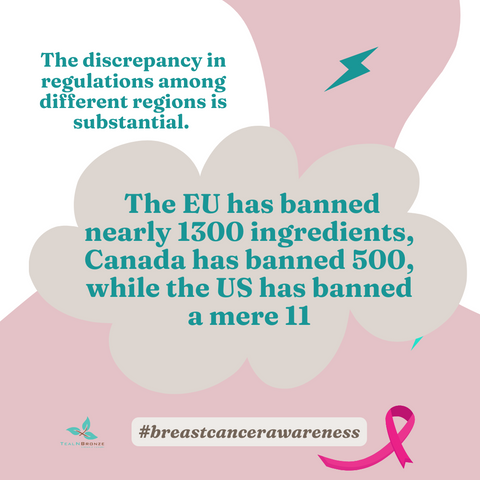In our daily lives, we encounter numerous sources of toxins. From environmental pollutants to the chemicals in the air, toxins from air fresheners, candles, detergents, and personal care products, we are surrounded by elements that contribute to our toxic load. This blog will shed light on the often-overlooked area of personal care products and their impact on our well-being.

Understanding the Problem
Did you know that the average woman uses nearly 16 personal care products daily, exposing herself to over 500 chemicals? These chemicals can find their way into our bloodstream because our skin absorbs approximately 60% of what we put on it. Shockingly, the discrepancy in regulations among different regions is substantial. The EU has banned nearly 1300 ingredients, Canada has banned 500, while the US has banned a mere 11. Moreover, the term "fragrance" can encompass up to 3000 questionable ingredients, evading strict regulations.
These toxins can lead to diseases and affect the performance of our vital organs. Considering that our skin is our largest organ, it becomes essential to ensure that the products we apply to it are safe and beneficial for our well-being.
For more detailed information about toxins in skincare, you can visit the Environmental Defence Toxic 10 Skincare Guide.

Connecting Toxins to Cancer
You might wonder how we transition from discussing air fresheners, skincare products, and daily routines to a topic as serious as cancer. The answer lies in how toxins can interact with our bodies. Toxins introduced into the body through various sources, including personal care products, can have harmful interactions with our cells.
Some toxins have the capacity to directly damage the DNA within our cells, leading to mutations. These mutations, in turn, can cause uncontrolled cell growth and the formation of tumors, which are characteristic of cancer. Furthermore, certain toxins can disrupt the body's ability to repair damaged DNA or regulate cell division. This disruption of normal cellular processes creates an environment in which cancer is more likely to develop.
Why Avoiding Toxins Matters
- Disease Prevention: Opting for toxin-free products reduces your exposure to harmful chemicals, supporting your long-term health. By minimizing hormone disruption and reducing exposure to carcinogens, you can significantly lower your risk of potential illness and disease
- Minimize Hormone Disruption: Toxin-free products are typically free of endocrine-disrupting chemicals, like parabens and phthalates. These compounds can mimic hormones in the body, potentially increasing the risk of breast cancer. Toxin-free choices reduce your exposure to these hormone-disrupting substances.
- Reduce Carcinogen Exposure: Many conventional personal care and household products contain carcinogens or chemicals linked to cancer development. Opting for toxin-free alternatives decreases your exposure to these potentially harmful substances.
- Support Overall Health: Toxin-free products often have ingredients high in antioxidants and anti-inflammatory compounds that help support the body's natural defense mechanisms against cancer and other diseases.
- Environmental and Ethical Impact: Toxin-free products are often cruelty-free and environmentally responsible. By choosing these products, you not only benefit your health but also align with ethical and sustainable values, promoting a healthier environment and responsible industry practices.

Nurturing Your Skin After Breast Cancer Surgery: Toxin-Free, Whipped Body Butter
Breast cancer is a life-altering journey that demands strength, resilience, and self-care, especially for those who have undergone breast cancer treatment. After undergoing breast cancer surgery, one’s skin may be more sensitive and in need of gentle care. Here’s why our toxin-free body butters can become your trusted ally in the healing process.
- Soothe and Moisturize: Whipped body products are known for their feather-light texture, which is crucial for those with sensitive post-treatment skin. This texture feels soft and soothing, allowing gentle application without tugging or pulling on the skin when applying to the surgical area and the surrounding skin. The rich, USDA certified, nourishing ingredients like shea butter and coconut oil, will provide deep hydration, helping to alleviate dryness and discomfort.
- Promote Healing with Gentle Massage: Gently massaging a whipped, toxin-free body butter into your skin in a circular, upward motion is not only a soothing experience but also a valuable part of post-surgery recovery. This gentle massage technique can enhance blood circulation, minimizing swelling, and aiding in the regeneration of healthy tissue. For post-surgery breast cancer patients, it's a comforting ritual that fosters both physical and emotional healing.
- Scar Support and Versatile Skin Care: Our body butters are versatile, designed to meet a range of skin care needs. From addressing dry skin to providing all-over moisturization and scar care, these multi-use products offer a holistic approach to skin health. Specifically formulated with ingredients like shea and cocoa butters, they are highly effective in reducing the appearance of surgical scars. Daily application of a small amount, gently massaged onto the skin, can yield significant improvements in scar appearance and overall skin health.
- Relax and Rejuvenate: Our body butters are scented with essential oils like lavender and lemon to provide healing and aromatic benefits through calming and soothing scents. Using them as part of your self-care routine can provide a sense of relaxation, physical comfort and emotional support during the post-surgery healing journey.
In conclusion, self-care is vital for breast cancer survivors and whipped body butters offer a unique blend of gentleness and effectiveness to help alleviate physical and emotional discomfort during and after treatment.
By minimizing exposure to harmful chemicals and making informed choices about the products you use are crucial steps towards a healthier lifestyle led by self-care and self-love.
Leave a comment